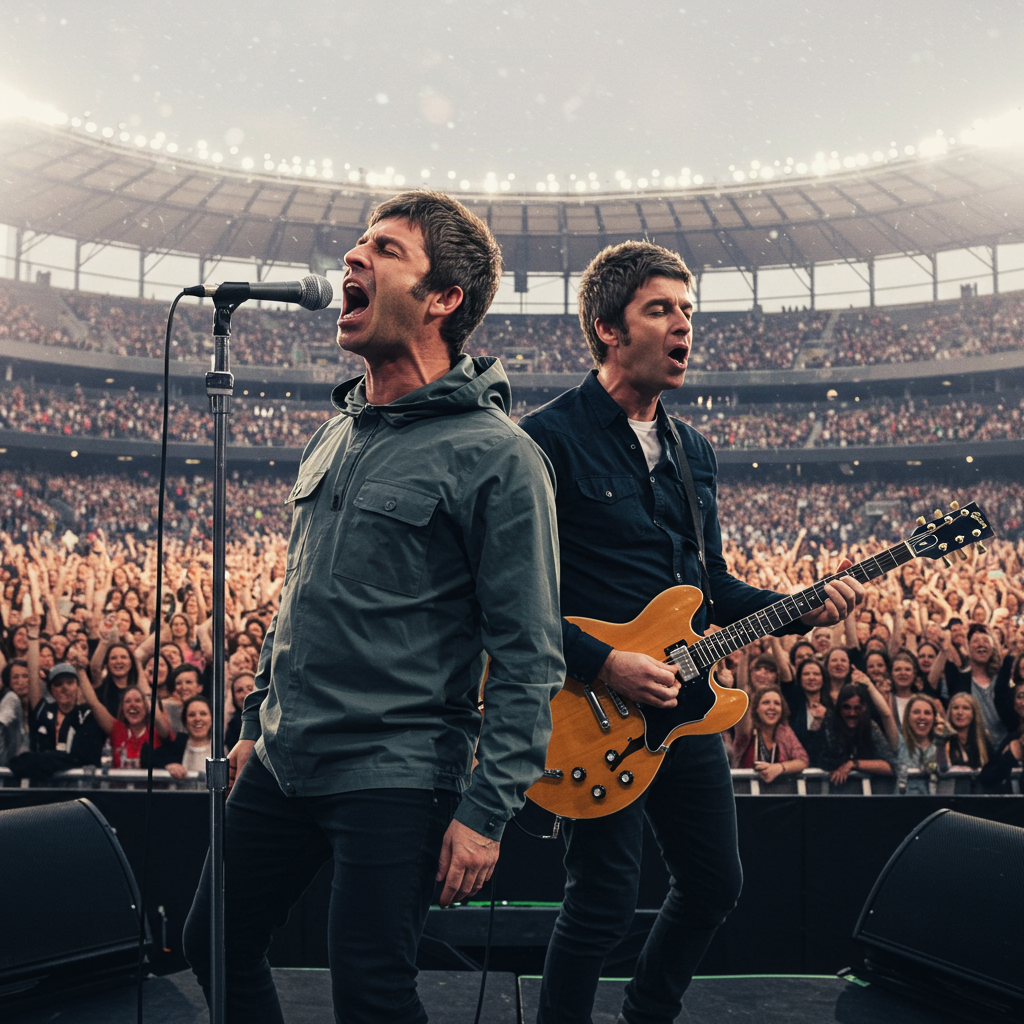British punk-rap duo Bob vylan sparked a major controversy at the Glastonbury Festival, drawing widespread condemnation and facing significant repercussions after shouting “Death to the IDF” during their performance. The incident on June 28, 2025, quickly went viral, prompting swift reactions from public figures, media outlets, and government bodies on both sides of the Atlantic. The band later defended their actions, claiming they were being unfairly targeted and that the backlash served as a “distraction” from the situation in Gaza.
The contentious moment unfolded during Bob Vylan’s set on Saturday, June 28. One member of the London-based group repeatedly chanted “Death, death to the IDF [Israel Defense Forces]” into the microphone. He then turned towards the audience, encouraging festival-goers to join the chant. Videos shared from the crowd perspective showed numerous Palestinian flags waving among attendees, with some people echoing the controversial phrase. The performance also included other anti-Israel slogans, such as “Free, Free, Free Palestine,” followed by “Hell yeah, from the river to the sea. Palestine must be, will be inshallah, it will be free.” This politically charged display immediately drew sharp criticism online.
Immediate Fallout and UK Reactions
The footage of the chants rapidly spread across social media platforms, triggering a wave of complaints. The reaction extended beyond online discussions, reaching high-level political circles in the United Kingdom. British Prime Minister Keir Starmer reportedly described the words used by the band as “appalling hate speech.” This official condemnation underscored the seriousness with which the UK government viewed the incident.
The British Broadcasting Corporation (BBC), which televised the Glastonbury Festival live, also took action. The BBC removed Bob Vylan’s set from its iPlayer streaming service. Additionally, the network issued a “very strong and discriminatory language” warning label during its livestream coverage of the performance. Glastonbury Festival organizers released their own statement on Instagram. They condemned the band’s actions, reminding the public that the festival was founded on principles of unity, music, and human endeavor, contrasting this with the divisiveness of the chants.
Police and Government Response
The repercussions for Bob Vylan continued to mount. Authorities initiated reviews into the incident. British police forces in Somerset and Avon confirmed they were examining videos of the performance. Their stated purpose was to “determine whether any offenses may have been committed that would require a criminal investigation.”
The controversy also had implications for the band’s future touring plans, specifically in the United States. The U.S. State Department moved to revoke the band’s visas, which were necessary for a planned U.S. tour later in the year. A senior State Department official commented on the decision, stating that the U.S. would not approve visas for “terrorist sympathizers.” This stance echoed previous warnings issued by Secretary of State Marco Rubio regarding rescinding visas for individuals linked to “terrorists.”
Bob Vylan’s Defense and Counter-Claims
In the face of mounting criticism and official actions, Bob Vylan took to their Instagram page to address the controversy directly. They published a post arguing that they were being deliberately “targeted” for expressing their views. The duo framed the situation as a challenge to freedom of speech, urging others who “care for the sanctity of human life” to also speak up.
The band sought to clarify their position, stating they are not advocating for the death of any specific group of people, explicitly mentioning “Jews, Arabs or any other race or group.” Instead, they claimed their focus was on the “dismantling of a violent military machine,” referring to the Israel Defense Forces. As justification for this stance, Bob Vylan cited reports alleging that IDF soldiers had been instructed to use “unnecessary lethal force” against unarmed civilians waiting for aid. They also pointed to the extensive destruction that had occurred in Gaza.
Context of the Gaza Conflict
The band’s reference to the situation in Gaza places the controversy within the broader context of the ongoing conflict following the October 7, 2023, attack on Israel by Hamas and other Palestinian armed groups. That assault resulted in significant Israeli casualties, primarily civilians, and the taking of hostages. In the year since, Israeli retaliatory military actions in Gaza have led to a severe humanitarian crisis and a massive death toll, exceeding 41,000 by October 2024 according to Gaza’s health ministry figures, alongside widespread destruction of infrastructure and displacement of the population.
Reports from organizations like Human Rights Watch have documented serious violations of international humanitarian law and potential war crimes committed by Palestinian armed groups during the October 7 attack, including willful killing and hostage-taking of civilians. Similarly, human rights groups and the UN have raised concerns about Israeli military conduct in Gaza, citing disproportionate force, collective punishment through siege, and attacks impacting civilians and infrastructure, potentially constituting war crimes. The band’s statements and the ensuing debate highlight the deep divisions and intense emotions surrounding this complex and volatile conflict.
Analysis: Free Speech vs. Hate Speech
The Bob Vylan incident at Glastonbury ignites a recurring debate concerning the boundaries of artistic expression, political protest, and hate speech, particularly within highly sensitive geopolitical contexts like the Israel-Palestine conflict. While the band asserted their right to free speech and framed their words as criticism of a military force they deem violent, their specific chant, “Death to the IDF,” was widely interpreted by critics as incitement or hate speech, especially given the ongoing hostilities and the IDF’s role in a national military.
The strong reactions from UK politicians and the US government underscore that such explicit language directed at a national military during wartime carries significant weight and consequence in the public and political spheres. The US State Department’s decision to revoke visas, linking the band’s statements to “terrorist sympathizers,” demonstrates a low tolerance for rhetoric perceived as supportive of violence against an ally’s military, regardless of how the speaker frames their intent. The controversy highlights the tightrope walked by performers who use their platform for political commentary, especially when employing language that others perceive as crossing the line into advocating harm or expressing discriminatory views.
Frequently Asked Questions
What specific comments did Bob Vylan make at Glastonbury that caused controversy?
During their performance at the Glastonbury Festival on June 28, 2025, British punk-rap duo Bob Vylan repeatedly chanted “Death, death to the IDF [Israel Defense Forces]” and encouraged the crowd to repeat it. They also chanted “Free, Free, Free Palestine” and “from the river to the sea. Palestine must be, will be inshallah, it will be free.” These remarks led to significant backlash.
What were the immediate consequences for Bob Vylan following the incident?
The band faced swift repercussions, including widespread criticism on social media. UK Prime Minister Keir Starmer reportedly called their words “appalling hate speech.” The BBC removed their set from its iPlayer and added a warning label. Glastonbury organizers condemned the actions. UK police began reviewing videos for potential criminal offenses, and the U.S. State Department revoked the band’s visas needed for a planned tour, citing a stance against “terrorist sympathizers.”
How did Bob Vylan respond to the criticism and actions taken against them?
Bob Vylan responded via Instagram, claiming they were being “targeted” for speaking up and linking the backlash to freedom of speech. They clarified that their message was aimed at the “dismantling of a violent military machine” (the IDF), not at any race or group. They also argued that the focus on them was a “distraction” from what they described as ongoing actions by Israel in Gaza, including alleged unnecessary force against civilians and destruction.
Conclusion
The Bob Vylan incident at the 2025 Glastonbury Festival serves as a stark illustration of the volatile intersection between political activism, artistic expression, and international conflict. The band’s use of highly charged language directed at the Israel Defense Forces provoked immediate and severe reactions, leading to condemnation from political figures, media censorship, and official actions like visa revocation. While the band defended their statements as legitimate criticism of a military force and claimed they were being unfairly targeted, their words generated a significant controversy that overshadowed their musical performance. The episode highlights the potential consequences for artists using their platforms for explicit political messaging, particularly regarding sensitive geopolitical issues like the Israel-Palestine conflict, and underscores the ongoing global debate surrounding free speech versus perceived hate speech or incitement. The event’s fallout demonstrates how quickly commentary on this conflict can escalate, impacting individuals and institutions alike.




